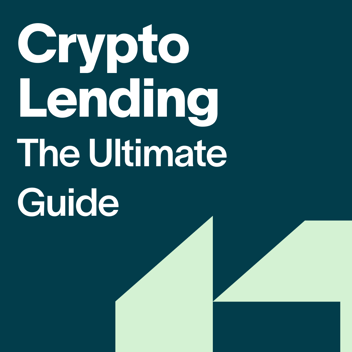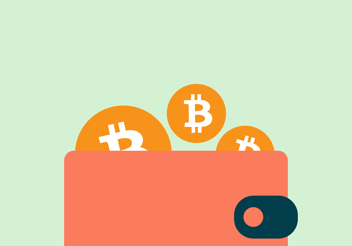Weekly Hodl: Unsecured Credit Doesn't Exist
.png?width=1920&height=1080&name=Banner%20%26%20LI%20-%20Sept%2025%20(1).png)
Ledn’s Weekly Hodl: Unsecured Credit Doesn't Exist
Week of Monday September 25th
Start earning up to 8.50% APY on your crypto with a Ledn Growth Account.
Bitcoin Market Analysis
Outside of a few volatility bursts, bitcoin has been trading in a very tight price range over the last 6 weeks. As the chart below demonstrates, bitcoin has ranged from a high of ~$28.2K and a low of ~$24.9K - and it currently sits dead in the middle of the range, at ~$26,500 at the time of writing. It’s also worth noting that spot traded volume has been decreasing gradually throughout the last 6 weeks.
While this may sound “unexciting” to some, on a relative basis, being flat over the last 6 weeks is actually a sign of strength. In the same time period, the S&P 500 is down -1.80%, the Nasdaq is down -1.50%, the U.S. dollar is up ~+1.62%. Want to know which other asset has returned 0% over the past 6 weeks as equities fall and the dollar rises? Gold.
So, what’s next?
Last week the Fed confirmed that it plans to hold its interest rates “higher for longer”. This comes as a response to soaring commodity prices (oil up +11% over the last 6 weeks), and labour strikes are resulting in higher wages. inflation fears have reappeared, and investors are sensing that higher yields, for longer periods of time will be needed to tame inflation. This has put downward pressure on equities and bonds - sending yields higher and stocks lower. For context, interest rates futures are pricing a 40% chance of one more rate hike this year, and see the first rate cut from the Fed in July 2024. Expectations leading up to last week’s meeting were for no further rate hikes this year and the first cut by May 2024 - so the timeline has been delayed yet again.
Speaking of delays, there’s a big political battle in the U.S. house of representatives, where Democrats and Republicans can’t reach an agreement to approve next year’s budget - and if they don’t come to terms by this Friday, the U.S. government could potentially shut down as of next week. This tension will likely keep the markets on high alert, and could introduce volatility in the coming weeks.
So far, it seems like the market is not pricing in a shut-down (yet), but implied volatility on S&P futures has been stubbornly high as of last week, suggesting that some investors could have started purchasing downside protection.
Our Weekly Essay: Unsecured credit doesn’t exist
We live in a credit-based society. Everything you do in the U.S. (and most modern societies) revolves around credit. If you need any evidence of this, just google “what to do as a new immigrant in the U.U.” - and you’ll get some version of this chart:
Step #2, after planning your moving costs, is to get a Social Security Number - your “Unique Identification Number” as an American Resident. This is the basis upon which your credit history will be built. And step #6, is “Build US credit history” - which is forever tied to your identity number.
Anyone who’s had to “build credit” from scratch understands what I’m talking about. As an immigrant myself, I’ve had to build up my credit history in Canada - and as I resided in the U.S. for a few years while I was younger, I’ve also had to ensure my U.S. credit history is in optimal health.
How do you build credit? You apply for a credit card. When I arrived in Canada I applied for a credit card, BUT - to get my first Visa I had to leave a $500 deposit at the bank, which, in return, gave me a $500 spending limit. It was a “fully secured” credit card. My first credit card didn’t really extend any “credit” to me - because my identity didn’t have any history - meaning, it had very little value to them (the bank). How does your identity become more valuable? By becoming “older”, getting debt and repaying it on time. For example, my secured credit card still reported that I made my payments on time. I got a phone, and the phone company wrote that I paid my phone bills on time, both of which helped me build my credit.
Then, one fine day - 3 years later, I was talking to a bank teller about a wire, and the branch manager overheard us talking. I was telling her about my excitement having been accepted into my university’s business school program, and the branch manager invited me to his office. That day I got a new credit card, and he gracefully extended the limit on my card to $5,000, and released my security deposit. I was elated - my Canadian identity had become more valuable. My first true credit card.
Your credit card company doesn’t trust you
The interaction above may lead you to believe that the bank manager “trusted me”. He didn’t. And your credit card company doesn’t trust you either. What they trust is that you value your identity and your right to participate in your developed country’s credit system. They trust that you value living here, and that you wouldn’t risk having to build your reputation from the beginning. It’s a lot of work - and a lot of burned bridges. They know that if you don’t hold your end of the bargain, they will be able to severely damage your credit identity in that country. This is their ability to enforce.
Not surprisingly, the countries that have strong credit systems are countries that see positive net migration. If people were getting indebted and leaving the country en masse, the system would break. Want to see an interesting chart? Look at the world map below from Statista for countries with net positive migration, and you’ll notice that countries with strong credit markets like the U.S., Canada, and Western Europe, all have positive net migration rates. (note: the South American migration rates during this period are distorted because of the Venezuelan refugee crisis sending waves of migrants to Colombia, Brazil, Chile and others).
Said differently, countries with working credit systems work because 1) the entire system is built around a single set of unique identifiers and 2) it’s made up of people with a strong incentive to stay in this system, and not leave.
Your credit card is not “unsecured”, it’s secured by something very valuable - your unique identity to the government, and all other financial institutions, in a country that most of the globe wants to live in. If you don’t hold your end of the bargain, credit card companies or anyone who extends your credit can make your life nearly impossible, and remove a lot of the benefits of living in a credit-based society.
As your life becomes more entrenched in that country, i.e. the more services you sign up for, the more credit you take on, the more taxes you pay, the more assets you buy - banks and lenders are willing to lend you more, because they know that you have more to lose by ruining your credit history and dampening your unique identity. They can demand their payment by threatening to make your life more difficult.
Most credit in the world is secured by collateral
Unsecured credit is a popular topic for a good reason - credit cards are the type of debt that most people have access to, as you need an asset to back most other types of credit, which materially narrows the pool of qualified applicants.
According to data from the Federal Reserve, as of Q1 2023, there were around 600 million credit card accounts in the U.S. vs just under 80 million mortgage accounts.
Conversely, most of the dollar value of U.S. household debt is made up of collateralized lending - with 81% of it being Mortgage debt, Home Equity lines of credit, and auto loans.
We should also note that ~93% of all student debt is issued by the U.S. federal government, so it cannot be considered as truly unsecured debt since it’s not a private issuer.
In other words, credit card debt, or “identity-based” debt, only represents 6% of the total household debt in the U.S. This is one of the most credit-dependent societies in the world, and only ~6% of the total household debt is secured by identity. In other words, the credit world runs on collateralized lending.
Is identity-based lending possible in a decentralized world?
As we highlighted above, identity-based lending relies on a heavily centralized system. One where one group (the u.s. government), has a monopoly on the identity system, and has the legal means and power to enforce on any violation of said system. This ensures that all market participants can rely on the system itself, and build a public database that they can all pull from and write into, in order to ensure that no person can “fool” the system.
Could this be replicated in a digital world? Theoretically, yes. However, it would require a standardized system that was open to all (think of everyone being able to get a U.S. social security number), and ensure that no one person can create 2 different IDs ever. The enforcement of duplicates is much harder than making the system open. Reputation-based lending systems have been tried and tested in the past. If there is no risk to enforcement beyond the borrower’s reputation in the platform, this inevitably leads to people building up their reputations, and then rugging everyone at the peak.
It’s as if we allowed people to build up their U.S. credit history, and create a new one with no repercussions when they can’t repay their debts. What do you think would happen? So, in order for these identity systems to work, you need a referee to make sure the fuels are followed, and an enforcer that ensures everyone is playing by the rules. What do these 2 things require? Centralization. We would all need to be participating or sharing our information to the same system. This creates a massive honey pot of information that would become an strategic asset for any government if it ever gets to scale.
But perhaps creating a global credit score based on your online persona is not too crazy of an idea. After all, we trust the government (and social media) today with all of our data - they know where we live, how much we make, what our credit score is, what assets we own, who we call, and in places like Canada, even your health data.
What are the implications for digital assets?
When I came to Canada, I had to build a new life based on my new Canadian identity. As I built my life here, I also built my credit, and with good credit, doors started opening for me. I’d love nothing more than to see a sustainable and well designed identity-based or reputation-based model for identity-based lending in digital assets. However, I believe we are far away from a technology solution that can facilitate that at scale.
And while the world doesn’t have access to a U.S. or Canadian Identity number, they do have access to bitcoin. And bitcoin is revolutionizing the largest lending market of all - asset-backed lending.
Before bitcoin, there was no asset that any lender in Canada could take as collateral from an international borrower to finance, with the ability to enforce on that collateral in the event of borrower default. Bitcoin changed this, forever.
Because of bitcoin, companies like Ledn can process loans for clients all over the world, at the same speed, terms, and quality of service, regardless of where they are. This was never possible before bitcoin. This is the definition of financial inclusion.
At Ledn, we’re working day and night to build the absolute best bitcoin-backed lending experience, and we’re already seeing the impact these services are having on people’s lives.
For a closer look at how these products are impacting people’s lives in real time, you can take a look at our reviews page - which we are incredibly proud of!
Digital asset lending will mirror traditional finance - with the lion’s share of loans being collateralized, and with a small fraction of total volume trying to innovate on identity-secured loans.
Lending against bitcoin will become cheaper, faster, and more efficient than lending against U.S. real estate. And the world at large will benefit from access to low-cost financing.
Bitcoin-backed lending will be one of the biggest lending markets in the world - and it will revolutionize financial markets, and societies worldwide. We are playing an active role in that process right now.
¡Viva la revolución!
HODL.
Notice for Canadian Residents: As of August 3, 2023, any Canadian BTC or USDC Savings Account is transitioned into a new non-interest earning BTC or USDC Transaction Account for the purposes of allowing Canadian clients to manage their Ledn loans.
Notice for U.S. Residents: As of August 3, 2023, any U.S. BTC or USDC Savings Account is transitioned into a new non-interest earning BTC or USDC Transaction Account. On that date, the account balance in any U.S. Legacy Savings Accounts will remain in such accounts and continue to be non-interest earning.
This article is intended for general information, educational and discussion purposes only, it is not an offer, inducement or solicitation of any kind, and is not to be relied upon as constituting legal, financial, investment, tax or other professional advice. This article is not directed to, and the information contained herein is not intended for distribution to, or use by, any person or entity in any jurisdiction or country where such distribution, publication, availability or use would be contrary to law or regulation or prohibited by any reason whatsoever or that would subject Ledn and/or its affiliates to any registration or licensing requirement. This article is expressly not for distribution or dissemination in, and no Ledn product or service is being marketed or offered to residents of, the European Union, the United Kingdom, the United States of America or any jurisdiction in Canada, and such product or service may only be marketed or offered in such jurisdictions pursuant to applicable laws or reliance on regulatory exemptions. A professional advisor should be consulted regarding your specific situation. Digital assets are highly volatile and risky, are not legal tender, and are not backed by the government. The information contained in this publication has been obtained from sources that we believe to be reliable, however we do not represent or warrant that such information is accurate or complete. Past performance and forecasts are not a reliable indicator of future performance. Any opinions or estimates expressed herein are subject to change without notice. This article may contain views or opinions of the author that do not necessarily reflect the opinions, standards or policies of Ledn. We expressly disclaim all liability and all warranties of accuracy, completeness, merchantability or fitness for a particular purpose with respect to this article/communication. Read our Disclaimers at https://ledn.io/legal/disclaimers



